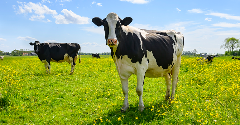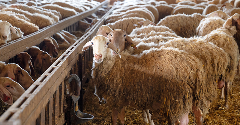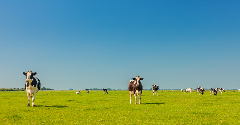News
Catered foodservice meals in the UK to have 20% less meat
24 Apr 2020Public sector caterers serving schools, universities, hospitals and care homes have pledged to reduce the amount of meat served on their menus by 20%. There is simultaneously a focus on reducing overall red meat offerings.
In response to a study earlier this year from the UK’s official climate change advisors that recommend people cut their consumption of beef, lamb and dairy products they eat by a fifth to combat climate change, caterers have committed to doing just that. This voluntary effort was spurred by public sector catering group PSC100 with the launch of the #20percentlessmeat campaign in the April issue of the trade magazine Public Sector Catering.

A reduction of meat consumption at this scale will remove 9m kg of meat from plates and 200,000 metric tonnes of carbon (the equivalent of 400,000 cars) from the atmosphere every year. For farmers, it means a reduction in demand for animal protein - 45,000 cows or 16 million chickens to be exact.
Farmers expressed fury at this initiative. The Daily Mail reported that British farmers were aghast at the commitment from the public sector, and Richard Findlay, Livestock Board Chairman of the National Farmers Union, stated the effort to reduce meat consumption and improve the environment was 'wholly inaccurate' and 'frankly ridiculous.'
However, multiple studies have shown that reducing the consumption of animal protein will have beneficial effects on the environment. Research from IDTechEX, the EAT-Lancet Commission, GRAIN, and the Institute for Agriculture and Trade Policy, among others, have repeatedly shown that greenhouse gasses and animal husbandry are linked and are having a detrimental effect on the environment.
Although launched as an independent effort, the Hospital Caterers Association (HCA), The National Association of Care Catering (NACC), the Local Authority Caterers Association (LACA) and the university caterers association TUCO have all joined the push to reduce meat consumption in the meals they provide. The movement has also gained external support from groups, including ProVeg International which aims to reduce the global consumption of animals by 50% by 2040.
As a quarter of the UK population consumes meals prepared by institutional caterers, such a large reduction will undoubtedly have an influence on the country’s eating habits.
Related news

Danone removes NutriScore from products
20 Sep 2024
Following an algorithm update that gives some of its sweetened drinks a worse score, Danone has removed the front-of-pack label, NutriScore, from all of its products – putting profit before public health, say campaigners.
Read more
Chobani develops shelf-stable, prebiotic-enriched Super Milk
12 Sep 2024
Chobani has launched a prebiotic-enriched, shelf-stable, high-protein dairy milk to support people in disaster zones who need a nutritious drink that does not require refrigeration.
Read more
Tesco trials methane mitigation supplement for dairy cattle
5 Sep 2024
Tesco is trialing a methane-reducing feed supplement for one of its key UK dairy farms, sustainable UK milk producer Grosvenor Farms.
Read more
Sheep and goat plague: A new threat to Greece’s feta production
27 Aug 2024
A recent goat and sheep plague outbreak threatens feta production in Greece. The flagship product accounts for roughly 10% of the country’s food exports, but Greek authorities say there is no cause for concern.
Read more
Nestlé develops a new fat reduction method for dairy ingredients
26 Aug 2024
A Brazil-based Nestlé research and development team has developed a way to reduce the fat in milk powder by as much as 60%, without impacting the key characteristics that consumers enjoy.
Read more
Dutch court rules against plant-based butter brand ‘Roombeter’: Only dairy products allowed to use the word ‘cream’
26 Jul 2024
A Dutch court has ruled against Upfield’s plant-based butter, Roombeter, stating that its use of the word ‘room’ (cream) in the product name violates European regulations that protect dairy-related terms allowed for dairy products only.
Read more
How will Denmark’s 2030 carbon tax impact farming?
12 Jul 2024
Denmark has announced plans to implement Europe’s first carbon tax on agriculture from 2030, targetting the farming sector’s CO2 emissions. How will it be implemented and how have farmers reacted?
Read more
Sweden updates front-of-pack Keyhole labelling rules
11 Jul 2024
The Swedish Food Agency has announced updates to the voluntary Keyhole logo, used in four Nordic countries, following recommendations to improve nutrition labelling.
Read more
Consumers dislike faba beans’ sensory profile
3 Jun 2024
Consumers display low acceptance of faba beans, with sensory properties such as bitterness a core concern, a study suggests. However, for product varieties such as cocoa-free chocolate, this attribute could prove to be a benefit.
Read more
Food scientists uncover new way to preserve nutrient and flavour quality
29 May 2024
Researchers have developed a method that guarantees food safety for low-moisture products, such as dried milk, while maximising quality by retaining vitamins, minerals, and flavours, they say.
Read more